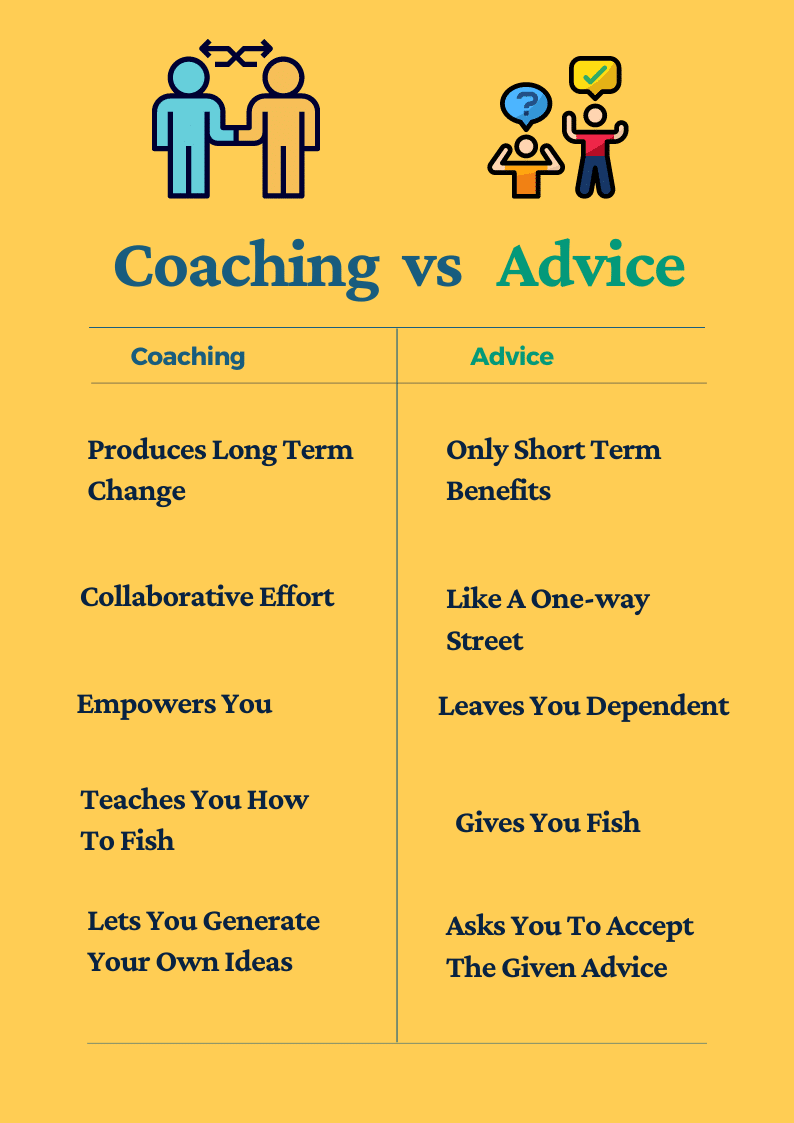We’ve all got an irresistible urge to offer advice. It’s a basic human instinct. We often switch to our expert, advice-giver, answer-it, solve-it, fix-it mode. A recent medical research study revealed doctors interrupt their patients with advice within 11 seconds. (Phillips, K.A., Ospina, N.S. & Montori, 2019)
But why do we feel compelled to advise to be helpful? Is it because we can predict the other person’s future mistake? Or we assume our knowledge will fast track their success? Or maybe it’s our ego — a need to use their situation to flaunt our knowledge and self-importance.
Coaching is a style of management characterized by asking questions, instead of the usual command and control style. You will find this article valuable if you manage people or have people coming to you for help often. I will share the 7 key differences between coaching (by asking questions) and giving advice, and why the former works better than the latter.
“Answers are closed rooms, and questions are open doors that invite us in.” — Nancy Willard.
7 Key Difference Between Coaching And Giving Advice
- Coaching Enables Long Term Behaviour Change. Advice Is Short Term
Think of it this way. If a member of your team comes up to you for advice, would you prefer working with them so that they learn, improve, and grow or would you prefer to get it sorted out as soon as possible?
Coaching not only solves the problem but also helps people grow. When you help people think things through, that leads to long-term behavior change. As a coach, you empower and help people build their own critical thinking and problem-solving skills.
On the other hand, offering suggestions or sharing your advice will solve their current problem faster, but you limit their potential to think for themselves. Any gains that come from giving advice is only short-term, without any long term learning. The next time people face a problem, they will again need your advice.
- Advice Is a One-Way Street, While Coaching Is Cooperative
Coaching is a mutual learning experience. It allows the person seeking help to dig deep into their own experience and begin to fit pieces of the puzzle for themselves. It is empowering for both the individual and the coach.
In contrast, advice is a one-way street with you holding yourself as the “expert“. You may feel good about advising the employee and solving their issue, but nothing has changed in reality.
As a coach myself, I often struggle to bite my tongue when I have the urge to dispense advice. I have realized that asking powerful questions is often a better way, and people often surprise you by coming up with better solutions than my “advice”.
Coaching people has allowed me to learn so much from my coachees, while giving advice is always a one-way street.

- Advice Can Be Crippling, While Coaching Empowers
It’s incredible what happens when you stop trying to be the “wellspring of knowledge” with all the answers. With advice, you are stifling people’s ability to arrive at their own solutions.
The truth is people already have the answers to their challenges within themselves. Your only task is to help them learn how to find theirs.
Yes, advice has its place, but when we coach people by asking open-ended questions, we pull them forward towards their potential by letting them think for themselves.
As a manager, you can see coaching as a tool to empower your people – helping you to take a hands-off approach.
- Coaching Is Teaching People How To Fish, Advice Is Giving Them Fish
Many leaders give people “great” advice only to see them not take it and not make any changes. After all, no one likes to be told what to do. And there is hardly any ownership when you are following someone else’s advice.
That is what differentiates coaching from advising. You ask simple, open-ended questions that draw out thoughtful responses. People are more motivated as it is their own idea, and they’re accountable to themselves.
- Coaching Lets People Think Big and Generate New Ideas. Advice Is Asking People to Accept Your Idea
The role of the coach is to help the coachee think without any shackles and decide for themselves what to do. Far too many people have an obsession with dishing out advice on anyone who will listen.
Advice stifles creativity and doesn’t create an opportunity for that person to think. Good coaches motivate their employees and encourage critical thinking and problem-solving. You will be surprised when people show resourcefulness and come up with big ideas on their own.
- Coaching starts with being curious and asking powerful questions. Advice leaves little room for brainstorming and dialogue.
At this very moment, people are solving unnecessary problems in their organizations. It is because leaders haven’t stayed curious enough to pull back the curtain on the real issues. That is why asking questions is more powerful than giving advice.
Coaching creates space to reach the heart of the issue. People often have the answers to their problems. Most times, what they’re looking for is a sounding board and a keen listener.
But when you advise people, you don’t expand their awareness. The advice trap makes it impossible for them to discover innovative solutions.
- Coaching shows humility, empathy, and respect. Advice gives a feeling of arrogance, indifference, and separation.
As humans, we have a strong reflex against being told what to do. It takes away our independence. We have a strong impulse for self-control and freedom.
So when we tell a person what they need to do, we wear the coat of authority, “I know what is best for you.” It is a poor move for a leader. When you push people, they will push back.
Sometimes, advice does the exact opposite of what you intend for it to do: damage relationships and push the person further away from a solution. Your advice will have zero worth if it doesn’t show respect and empathy for people to independently figure out things.
Coaching creates a space for people to express their feelings and validate their ideas. It says to them: I see you, I hear you, and I value you.

How To Ask Powerful Questions
The one critical skill in coaching is asking powerful questions. It is at the heart of any good coaching session. It creates authenticity in the relationship and also inspires confidence.
Below are 5 principles to follow when asking powerful questions:
- Ask open-ended questions. Don’t ask questions that have one-word answers.
The way you pose questions is very important. Don’t ask questions people can answer with a yes, no, or other one-word response.
Ask questions that make people pause and think, and probe deeper. Some of my favorite questions start with “How so?”, “Tell me more about …”, and “Why is that important to you?”
These types of questions are uncomfortable because they break down defenses and challenge people to think differently and see things from fresh perspectives. For example – How do you hope to personally and professionally benefit from working on this project?
- Be curious. Ask one question at a time. Then shut up and listen. Get comfortable with silence.
Silence is uncomfortable and awkward. Nobody likes those pauses in conversations. We often feel a need to fill up the void, but that moment of silence encourages people to think for themselves.
You need to learn to shut up and be genuinely curious when your coachee is thinking something through. Imagine this scenario: You’re coaching an employee. She starts to think about taking on a new initiative, and there’s a short back and forth.
Then there is silence while she reflects. It is at this stage you need to hold off since she’s weighing options. Whatever she says next is going to be important and useful to her.
- Don’t ask leading questions
Leading questions invite a yes or no. Lawyers use these types of questions during cross-examination to manipulate the conversation towards a certain way. For instance, “Do you feel Bill bullies you?” is a leading question while “How would you describe Bill’s behavior towards you?” is not.
Don’t assume for other people, or put words in their mouths by asking leading questions. Your questions should get your coachees to do most of the talking and thinking. People need space, time, and acceptance to feel heard and then think their way through their fears, difficulties, and challenges.
- Ask deep and meaningful questions that make people think
The art of questioning is a powerful tool in coaching and leading others. Powerful questions change the way you connect with people. These questions give your employees time to think about what is really important to them.
We have well-rehearsed and scripted answers for the usual questions. Powerful Questions makes one think and come up with original answers. If a question makes you think about your life, priorities, values, etc, it is a powerful question.
They don’t linger on the surface where there is emotional safety. Instead, powerful questions force you to be vulnerable. It requires some courage to face the discomfort of answering a Powerful Question.
They take longer to answer, but they often end up revealing something important about yourself which you were not aware of before. For example – What is “on hold” in your life? What is that you want to do someday / one day? What are you waiting for?
- Don’t assume. Instead, challenge yours and others’ assumptions by asking, “What are we assuming in this situation”?
Our assumptions often sabotage many well-meaning intentions. Here is what I mean. When assumptions appear in your mind, you may tend to rush to conclusions and make a poor judgment. You need to recognize this immediately and stop.
Instead, be curious. Ask yourself and the person you’re coaching about what you don’t know. Let people know when you make an assumption. Doing this will trigger both self-awareness and clarity for everyone involved.
Conclusion
Remember that coaching is not about you – but about the employee. When an employee asks for your help, they often need the time and space to think it through. Coaching aims for development first, performance second. Though, over the long-term coaching leads to more sustained performance too.
A good coach empowers their coachees to be more confident and solve their own problems in an empathetic way.

References
- Phillips, K.A., Ospina, N.S. & Montori, V.M. Physicians Interrupting Patients. J GEN INTERN MED 34, 1965 (2019). https://doi.org/10.1007/s11606-019-05247-5
- https://hbr.org/2014/12/the-questions-good-coaches-ask
- https://www.forbes.com/sites/forbescoachescouncil/2018/11/21/coaching-isnt-just-questions/#67eaff8447a1
- https://www.deployyourself.com/deploy-yourself/asking-powerful-questions-51-different-situations/

Trackbacks/Pingbacks